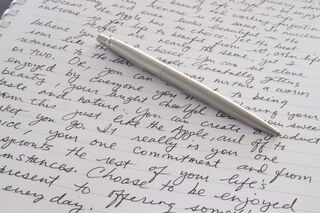Happiness
Writing Your Way to Happiness
We know that journaling is important. But what are we supposed to journal about?
Posted June 28, 2022 Reviewed by Tyler Woods
Key points
- Your perspective can change in a matter of weeks if you journal about these 9 essential elements.
- There are three forms of gratitude: feeling it, writing it, and sharing it out loud; sharing it makes your happiness spike.
- Journaling about emotional discomfort forces you to see the part you play in your resentments.
- Brainstorming new ideas triggers dopamine and makes us feel like we're accomplishing something.

Numerous studies have shown the benefits of writing out your feelings on a regular basis.
But experts are often so focused simply on motivating people to journal that they don’t discuss the importance of what to journal about.
That’s why, with the help of dual-board certified psychiatrist Josh Lichtman, I developed a framework for my journaling practice based around nine elements (self-care, goal setting, acts of service, recognizing FEAR, dealing with resentments, developing faith, recognizing progress, practicing gratitude and coming up with new ideas). We’ve given the journal to people I work with and the results have been amazing: entire perspectives have shifted in a matter of weeks.
Of course, everyone is going to respond to different journal prompts. So the most important way for you to start journaling is to determine what aspect of your life you want to focus on.
Finding Your Focus
I had learned through recovery that my perspective, when it comes to resentment, is often out of whack. When I resent someone, my ego often steps in to convince me I’m right and the other person is wrong, no matter the facts.
My point of view tends to be equally skewed when it comes to fear: my defense mechanisms often prevent me from even seeing when I’m afraid. Fear, I realized after journaling about it for some time, often registers for me as depression or loneliness, or even fatigue.
Journaling about my emotional discomfort forces me to see the part I play in my resentments and also gives me the space to acknowledge that a lot of my discomfort is fear.
Gratitude is Key
We all know that it’s important to feel grateful and that gratitude lists are a wonderful way to instill the feeling. But just how much of a difference it can make is significant.
According to coach Tony Child, the author of VisionShift, there are three forms of gratitude: feeling it, writing it, and sharing it out loud. “Your gratitude spikes 42 percent when you share it,” he explains.
While I don’t always get to the point where I’m sharing my gratitude out loud, I do try to write five things I’m grateful for every night.
Jeff Kober, a meditation teacher and the author of Embracing Bliss: 108 Daily Meditations, has an annual ritual where he invites people over on New Year’s Eve and has them write a list of 108 things that they’re grateful for. “Gratitude is one of the shortcuts to bliss,” he says.
The Importance of Self-Care
One of the most obvious and yet overlooked activities that helps people feel their best is self-care, which is why I ask myself every night what self-care I practiced that day. As a result, I not only get to experience the benefits of self-care but also see how I can switch it up.
Many of my students responded similarly. “I meditate daily but I desperately need a self-care that's more physical and there were several evenings I found myself going for a walk because I knew I had to answer that question,” says meditation teacher and author Jenna Tighe. “The question helped me be more mindful of what is really needed.”
“Self-care is often the first thing to go when people are busy or stressed,” says my journal consultant, Josh Lichtman. “Whenever a patient tells me they feel off and aren’t sure why, my first question is, ‘Have you been exercising?’ The answer is often, ‘No.’ Knowing that you’re going to be tracking your self-care in a journal makes you so much more likely to be accountable and actually do it.”
It's crucial to know, however, what self-care is to you. I read that Oprah says she practices self-care by spending Sundays lounging around in her pajamas. I’d go out of my skin if someone told me I had to spend Sundays in my pajamas, since my form of self-care is more along the lines of going out for a hike or seeing friends. So, as the saying goes, you do you.
And then write about it in your journal.
Setting Goals, Recognizing Progress and Faith
Goal setting, progress, and faith are three other elements we focus on in the evening journal.
Since we know that tracking our progress helps us achieve our goals, I always write down the steps I took toward achieving my goals and the progress—personal or professional—I made each day.
But the most significant aspect of my journaling practice is when I acknowledge the role faith plays in my day. I do this by asking myself every night what signs I saw that day that the universe was looking out for me. It can be something as simple as not getting a parking ticket when I thought I would. The point isn’t that God cares about my parking woes. It’s that this question keeps me on the lookout for a spiritual connection throughout the day. Oftentimes, just the seeking is all it takes for me to feel connected.
The Ideas Just Flow
My final question every night is about what ideas I came up with that day. Somehow, going through the above-described process gets me clear enough to remember ideas I may have thought during the day or jotted down on pieces of paper I would probably lose. Now they’re in a place where I can easily see which I want to pursue.
This is my last question because I never feel more alive than when I’m brainstorming ideas, whether it’s for new books, business ideas, or personal projects. And, psychologically speaking, this makes sense. “Dopamine is triggered whenever you achieve something and brainstorming new ideas gives you a sense that anything is possible,” Lichtman explains. “The combination floods your brain with feel-good chemicals.”
Feel-good chemicals, new ideas, and progression toward getting what you want? I say grab the pen and go get it.




